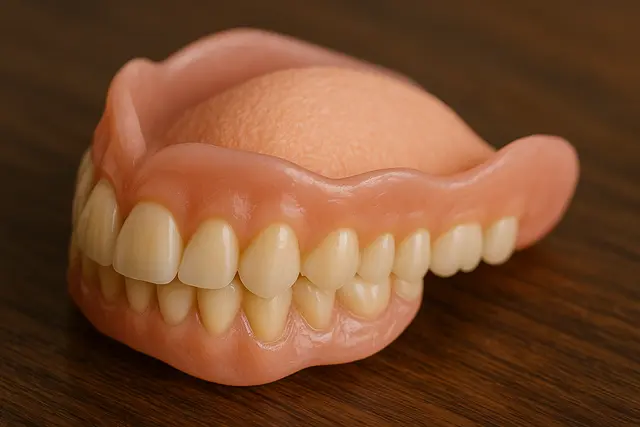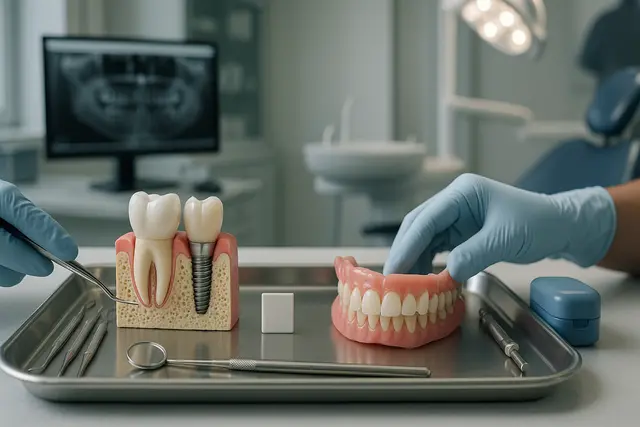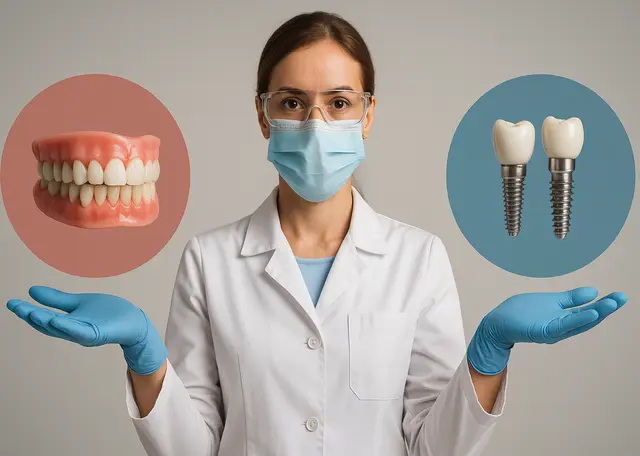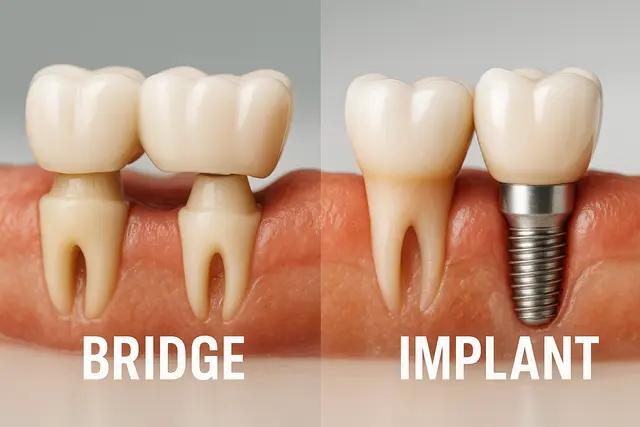Prosthodontics
5 min read
May 26, 2025
What Is a Soft Reline for Dentures? Here’s How It Works
If your dentures don’t feel quite right anymore, maybe they slip, rub, or just don’t sit like they used to, you’re not alone. A soft reline could be the simple, comfortable fix your mouth’s been waiting for.

You know that sigh of relief when a shoe finally breaks in and stops rubbing your heel raw? That’s exactly how a denture should feel, only, instead of your heel, it’s your gums. Unfortunately, mouths change shape faster than shoes wear out, and one day you may discover the plate that once snapped into place now rocks like a wobbly table.
Rather than scrap a perfectly good set of dentures, most folks simply need a reline. A soft reline, in particular, can turn ill-fitting dentures back into well-fitting friends, and it all happens in less time than a lunch break.
Why Dentures Stop Fitting Like They Used To
A denture is more than plastic teeth; it’s a daily companion that lets a denture wearer dig into steak, tell stories without spitting syllables, and grin for family photos. Traditional dentures hug the gum ridge, but biology has plans of its own.
Bone loss quietly reshapes that ridge, so the denture that used to fit properly starts sliding. When that happens, denture adhesive becomes a crutch, eating or speaking turns awkward, and sore spots bloom along the tissue. The goal is comfort and fit, not a glue bath, and that is where a timely reline steps in.
What Exactly Is a Reline?
When your clinician mentions a reline, they are talking about refreshing the inner lining so the dentures fit the new landscape inside your mouth. A reline is a process, not a replacement.
The dentist will examine the plate, mark sore spots, and decide which kind of reline you need. By adding material to the inside, they reshape the denture base instead of ordering full replacement. It is quick, cost-effective, and keeps an old friend, your denture, working a while longer.
Hard Reline vs. Soft Reline: What’s the Difference?
A denture reline comes in two broad flavors: hard and soft. A hard reline relies on hard acrylic material that will last longer but feels rigid. A soft denture reline, on the other hand, uses a pliable material that cushions tender gums. The differences between soft and hard matter most when you have sore gums or delicate soft tissue. If pressing a finger on your ridge makes you wince, soft is usually the better call.
What a Soft Reline Actually Does for You
So what makes a soft reline for dentures feel so kind? The dentist coats the surface of an existing denture with a gel-like compound, seats it against your gums, and lets it cure. That inside surface of an existing cushion acts like a memory-foam insole, spreading pressure evenly and stopping irritation caused by ill-fitting dentures.
Soft relines are often recommended right after extractions, with immediate dentures, or any time bone resorption leaves a plate bobbing like a life raft. The result is a secure fit without mountains of paste.
Here’s What to Expect During the Appointment
At the appointment, your general dentist roughens the surface of the denture so new material bonds, adds the soft mixture, then seats the plate so it captures every ridge. That allows the patient to chew later the same day.
If finer tuning is needed, the dentist can help by taking an impression and letting the dental lab finish the work while you wear a temporary liner. Either way, necessary adjustments are minimal and the payoff is huge.
How to Choose the Right Type of Reline for Your Needs
Denture relines come in chairside, lab, and temporary versions. Hard and soft are the big categories, but temporary relines serve as bandages while gums heal or swelling settles. The type of reline is best chosen by weighing tenderness, timing, and even future plans for an implant. Ensuring that your dentures sit comfortably starts with a frank chat about lifestyle and budget.
Keeping Your Dentures (and Gums) Healthy Over Time
Good dental care doesn’t end once the denture leaves the office. Maintaining good oral health means cleaning the plate, massaging the gums, and scheduling regular visits for proper care.
Don’t wear your dentures overnight unless your provider insists; dentures may look invincible, but due to aging and bone resorption they loosen slowly. General dentistry check-ups catch tiny shifts before they become cracked acrylic or raw ridges, a cornerstone of general dentistry most people overlook.
Don’t Wait Too Long to Get Your Dentures Relined
Many patients wait until old dentures clack mid-sentence before acting. Don’t. Get your dentures relined as soon as they wobble or rub. Relining your dentures can provide improved comfort and fit, keeping the set securely in place and letting you enjoy crunchy food again. A few millimeters of soft material can mean the difference between hiding your smile and flaunting it.
Why the Dental Lab Sometimes Gets Involved
Sometimes chairside work is plenty; other times the dentist will send the dentures to fit the master cast in the lab. That trip lets technicians skilled in general dentistry fine-tune the plate so the denture to improve your bite feels like new dentures, not patched plastic.
When the parcel returns, you test it, the clinician checks fit and comfort, and minor edges are polished away. Most folks walk out stunned that a plate they thought doomed now feels lighter than day one.
Relines Aren’t Forever, Here’s When to Go Back
Even the best reline wears down. Soft layers compress faster than hard acrylic, and your mouth keeps changing shape. When dentures need to be adjusted again, resist the urge to fix dentures at home.
DIY kits can ruin the seal on the surface of the denture and shorten its life. Trust a professional; they know how to add fresh material to the inside surface of the denture so it will last longer.
Tips to Keep That Comfortable Fit Going Strong
A reline is part of lifelong denture maintenance. Schedule yearly checks, avoid chomping ice, and rinse after meals. Use a soft brush to clean both the plate and your natural teeth around partial dentures. If you wear dentures daily, treat them like family heirlooms. This habit ensures a comfortable and secure mouthfeel for years to come.
Soft relines might sound minor, yet they are unsung heroes that keep dentures fit despite time’s steady march. They offer a practical, gentle fix needed for optimal comfort, and once you feel the difference, you’ll wonder why you waited.
What Is a Soft Reline and Why Might I Need One?
A soft reline involves adding a cushion-like material to the inside of your denture to improve fit and comfort. It's especially helpful if your gums are tender, you've experienced bone loss, or your denture has started slipping or causing sore spots.
How Is a Soft Reline Different From a Hard Reline?
A soft reline uses a flexible, gel-like material that’s gentler on your gums, while a hard reline uses a rigid acrylic. Soft relines are ideal for patients with sensitive tissue or recent extractions, while hard relines offer longer durability but less cushioning.
What Should I Expect During a Soft Reline Appointment?
During the visit, your dentist will roughen the inside of your denture, apply the soft reline material, and seat it in your mouth to mold it to your gums. The process is quick, typically done chairside, and you can usually eat comfortably later that day.
How Long Does a Soft Reline Last and When Should I Get Another?
Soft relines generally last several months to a year, depending on use and oral changes. If your dentures start slipping, clicking, or causing irritation again, it’s time to revisit your dentist for an adjustment or another reline.
Read Next
Related Posts

Prosthodontics
Implant vs. Dentures Pros and Cons: A Deep Dive into Modern Solutions
Missing teeth can impact more than just your smile, they can affect how you eat, speak, and feel about yourself. Fortunately, modern dentistry offers two leading solutions to bring back both function and confidence: dentures and dental implants. Understanding the pros and cons of each can help you make the choice that fits your needs, lifestyle, and budget.
7 min read
Oct 17, 2025

Prosthodontics
Full Mouth Implants vs. Dentures: Which Is Better for You?
When it comes to replacing missing teeth, the choice between full mouth dental implants and dentures can be overwhelming. Each option has its own set of benefits, limitations, and long-term considerations, making it essential to understand what works best for your needs, health, and lifestyle.
5 min read
Oct 17, 2025

Prosthodontics
Tooth-Supported Bridge vs. Implant Comparison: Benefits, Drawbacks, and Insights
Deciding between a dental bridge and a dental implant can feel overwhelming, especially when both options promise to restore your smile and improve oral function. Each solution comes with its own set of benefits, considerations, and ideal use cases, making it essential to understand how they compare before choosing what’s right for you.
6 min read
Oct 17, 2025
Don’t have time to research every dentist around you?
See why 30k+ patients trusted us